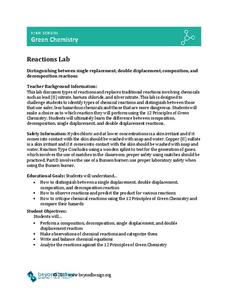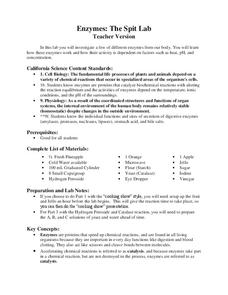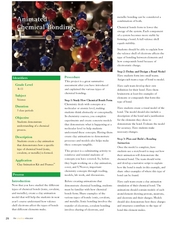LABScI
Atomic Structure and the Periodic Table of Elements: The Secret Agent Lab
Food always gets attention! Model atomic structure using fruit loops to represent the subatomic particles. After building models, scholars create ionic bonds using their models. Finally, they use these concepts to create a periodic table.
Virginia Department of Education
A Crystal Lab
Young chemists grow ionic crystals, metallic crystals, and supersaturated crystals in three different lab experiments. Observing these under a microscope allows pupils to compare the various structures.
Beyond Benign
Reactions Lab
You're bound to get a reaction from your classes with this experiment! Scholars perform several chemical reactions, make observations, and classify the reactions as single replacement, double replacement, composition, or decomposition...
LABScI
Enzymes: The Spit Lab
Enzymes in our bodies each have a job to do. Learn the factors that affect the activity of some enzymes using the third activity of an informative 12-part biology series. A three-part laboratory activity asks teams to investigate how...
Curated OER
Animated Chemical Bonding
Students demonstrate their understanding of a chemical process. In this exploratory lesson students create a clay animation that shows how a specific type of chemical bond.
Curated OER
A Very Simple Conductivity Meter
Students conduct a simple conductivity meter to test the ionic or non-ionic nature of water samples including one from their home.
Curated OER
Polymers
Students explore online tutorial on polymers. In this chemistry lesson, they create two polymers in the lab and compare their properties. They write a sales letter about their new and improved polymer product.
Alabama Learning Exchange
Float or Sink?
Experiment with mass and density as scholars figure out what makes things float or sink. First, they watch a podcast introducing these concepts. Be sure to use the comprehension question to test their understanding. Young scientists...
Virginia Department of Education
Matter and Energy: Equations and Formulas
Using simple materials, an informative lesson demonstrates the Law of Conservation of Matter and explains how to balance chemical equations. Young chemists perform experiments, analyze reactions, and balance chemical equations on their...
Curated OER
Solution Chemistry Investigation
Students engage in a lesson that is concerned with the concepts related to solution chemistry. They calculate the molar mass of various chemical compounds. Then students predict the anion ratio for ionic compounds. Students also write...
Curated OER
How Genes Work Lesson Plan
Students define the key terms that are the structure and function of DNA. In this genetics lesson plan students complete a lab activity in which they construct a model DNA structure.
Curated OER
Introduction And Brief History of Materials Science
Learners develop an understanding of the concept of matter. They l participate actively in the bubble raft experiment as described on the Center for Thermal Spray Research's website. They demonstrate dislocations and grain...
Curated OER
Oil Embargo!
Ninth graders generate and analyze data to determine which and how much of two polymers best absorb oils, formulate procedure to accurately determine how many times its own weight particular polymer can absorb, and develop understanding...
Curated OER
Tie Dye
Students practice writing research proposals to test the color fastness of a dye once it has been exposed to a t-shirt. Each proposal needs details of experimental design, length of treatment, and means of cleaning the shirt. All...
Curated OER
Micro-Magic With Sticky Ions
Students view a video about the formation of precipitates. They complete a worksheet that asks them to identify what makes a compound form and what holds it together.
















